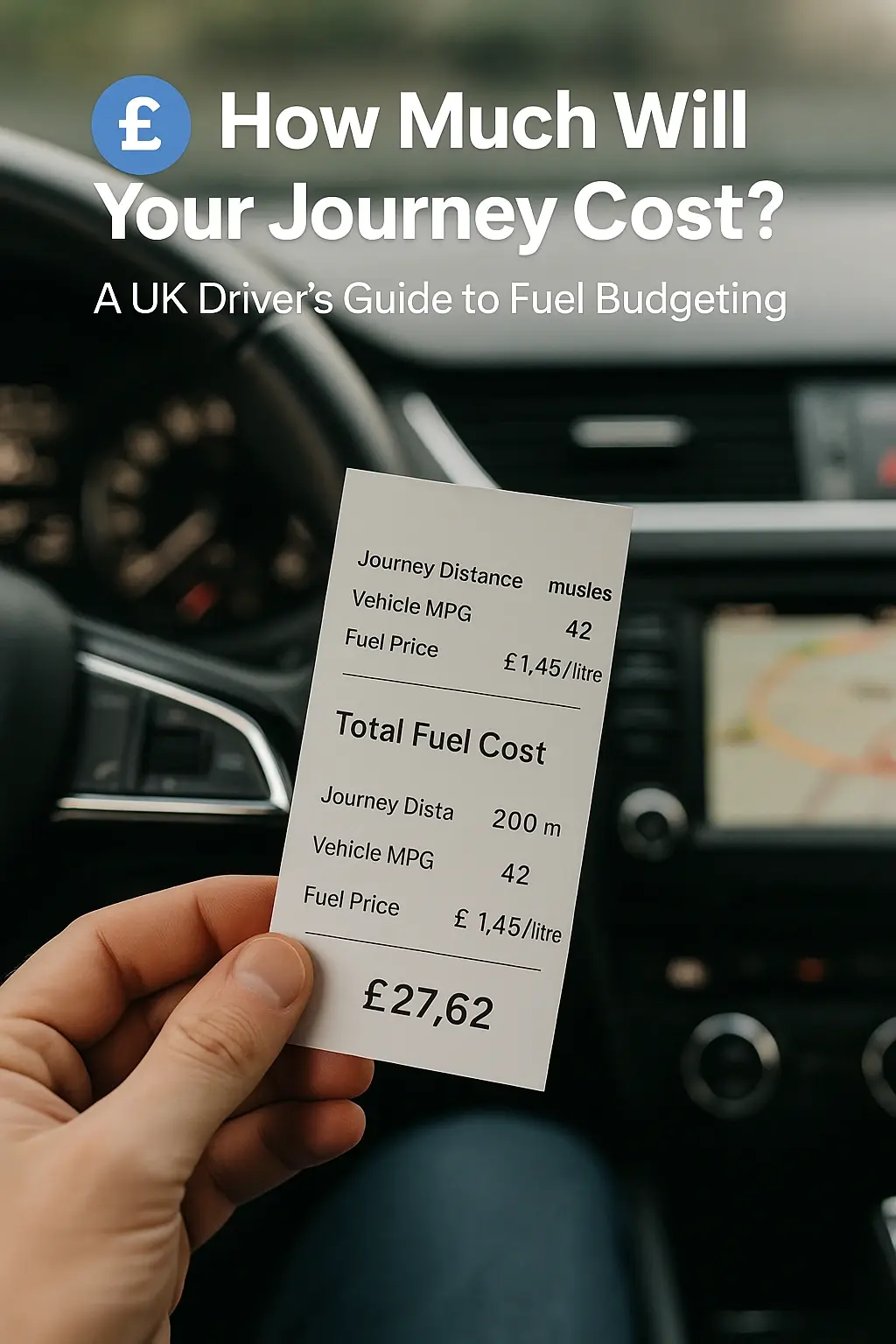You're planning a trip. Maybe it's a weekend away, a family visit 200 miles up the motorway, or just your daily commute. The question hits you: "How much is this actually going to cost me in fuel?"
With petrol hovering around £1.40–£1.50 per litre in 2025, fuel costs aren't something you can ignore anymore. But working it out manually — converting MPG to litres, multiplying by distance, factoring in price per litre — feels like doing GCSE maths at the petrol pump.
Here's the simple solution: a journey cost calculator. And more importantly, here's how to use one properly so you actually budget realistically — not just for fuel, but for the total cost of getting from A to B.
📌 What Is a Journey Cost Calculator?
A journey cost calculator helps UK drivers work out how much fuel they'll need for a specific trip, based on distance, vehicle efficiency (MPG), and current fuel prices.
What it tells you:
Total fuel cost for the journey
How many litres you'll need
Cost per mile
Cost-sharing options if you're travelling with others
What it doesn't tell you (but should):
Parking fees
Tolls (Dartford Crossing, Severn Bridge, etc.)
Wear and tear on your vehicle
Whether public transport might actually be cheaper
We'll cover all of that below.
🧮 How to Calculate Your Journey Cost (Step-by-Step)
The Formula
Journey Cost = (Distance in miles × Fuel price per litre × 4.546) ÷ Vehicle MPG
Why 4.546? Because 1 UK gallon = 4.546 litres. Your car's efficiency is measured in MPG (miles per gallon), but you buy fuel in litres — so you need to convert.
Example Calculation
Scenario: You're driving from London to Manchester — 200 miles. Your car does 45 MPG. Fuel is £1.45 per litre.
Step 1: Calculate litres needed 200 miles ÷ 45 MPG = 4.44 gallons 4.44 gallons × 4.546 = 20.2 litres
Step 2: Calculate cost 20.2 litres × £1.45 = £29.29
Or, using the formula directly: (200 × 1.45 × 4.546) ÷ 45 = £29.29
Done. That's your fuel cost.
🚗 Real-World Journey Cost Examples (UK Routes, November 2025)
Route | Distance | Avg MPG | Fuel @ £1.45/L | Total Cost |
London → Manchester | 200 miles | 45 MPG | 20.2 litres | £29.29 |
Birmingham → Edinburgh | 280 miles | 40 MPG | 32.0 litres | £46.40 |
Bristol → Newcastle | 300 miles | 50 MPG | 27.3 litres | £39.59 |
Cardiff → London | 150 miles | 42 MPG | 16.3 litres | £23.64 |
Liverpool → Brighton | 260 miles | 38 MPG | 31.2 litres | £45.24 |
Key takeaway: Even a "short" 150-mile trip can cost you £20–£25 in fuel alone. Add parking and tolls, and suddenly that £30 train ticket doesn't look so bad.
💡 The Hidden Costs Most Journey Calculators Miss
Fuel is just one part of the equation. Here's what else you need to factor in:
1. Parking
In city centres, parking can often cost more than the fuel itself. London? £20–£40 per day easy. Manchester, Birmingham, Edinburgh? £10–£20. Even smaller towns charge £5–£10.
Add this to your calculation or you'll get a nasty surprise when you arrive.
2. Tolls
UK toll roads and bridges include:
Dartford Crossing: £2.50
Severn Bridge (M48): Free now, but used to be £6.80
M6 Toll: £7.90–£9.00 depending on vehicle
Mersey Tunnels: £2.00
Not huge individually, but they add up on longer routes.
3. Wear and Tear
For business travel or long journeys, add 10–20% to your fuel costs to account for tyre wear, oil changes, and general vehicle depreciation.
Example: That £29 London-Manchester trip? Add £3–£6 for wear and tear. Total: £32–£35.
4. Food and Breaks
Motorway service stations are expensive. If you're stopping for coffee and a meal, budget another £10–£15 per person.
🚆 Is Driving Actually Cheaper Than the Train?
This is the question everyone asks — and the answer is: it depends.
When Driving Wins:
You're travelling with 2+ people — split the cost and driving is almost always cheaper
You're going somewhere with no direct train route — multiple connections add time and cost
You need flexibility — no set departure times, can stop when you want
You already own the car — sunk costs mean you're just paying for fuel
When the Train Wins:
You're travelling solo — train tickets (especially off-peak) often beat fuel + parking
You're going to a city centre — parking costs destroy any fuel savings
You can work or relax en route — productive time vs driving stress
You're doing a return journey same-day— no overnight parking charges
Real Comparison Example:
London → Manchester (solo traveller)
Option | Cost Breakdown | Total |
Driving | Fuel: £29 + Parking: £15 + Tolls: £0 + Wear: £3 | £47 |
Train (off-peak) | Advance ticket | £30–£50 |
Train (peak) | Standard ticket | £80–£120 |
Verdict: Off-peak train wins for solo. Driving wins if you have 2+ passengers (£47 ÷ 2 = £23.50 each).
🧾 How to Use a Journey Cost Calculator Properly
Most people just plug in distance and MPG and call it done. Here's how to actually use one to make smart decisions:
Step 1: Get Your Real MPG
Use accurate figures for your MPG rather than manufacturer claims. Dashboard readouts can be optimistic by 5–10%. Calculate your actual MPG over a tank to be safe.
Step 2: Use Current Local Fuel Prices
Fuel prices vary by location and change regularly. Check petrol station apps or sites like PetrolPrices.com for your area — don't just use national averages.
Step 3: Add All Hidden Costs
List out:
Parking (check rates in advance online)
Tolls
Food/breaks
Wear and tear (10–20% of fuel cost)
Step 4: Compare With Alternatives
Run the same journey through:
Trainline.com (train prices)
National Express (coach)
Carpooling options
Only then can you make an informed decision.
📊 Journey Cost Breakdown: What You're Really Paying
Here's what a typical 200-mile return journey actually costs when you include everything:
Cost Type | Amount |
Fuel (200 miles @ 45 MPG, £1.45/L) | £29.29 |
Return journey | £29.29 |
Parking (city centre, 1 day) | £15.00 |
Tolls (if applicable) | £5.00 |
Wear and tear (20% of fuel) | £11.72 |
Food/coffee at services | £10.00 |
Total | £100.30 |
That "£30 in fuel" trip just became a £100 trip. This is why journey calculators that only show fuel cost are misleading.
💳 Smart Tips to Reduce Journey Costs
1. Drive During Off-Peak Hours
Driving at steady speeds rather than stop-start traffic improves fuel efficiency significantly. Avoid rush hour — you'll save fuel and stress.
2. Use Cruise Control on Motorways
Cruise control maintains consistent speeds, which improves mileage since you avoid sudden starts, stops, and fluctuating speeds.
3. Check Tyre Pressure
Driving with low tyre pressure increases fuel use. Check weekly — properly inflated tyres can improve efficiency by 3–5%.
4. Plan Your Route
Use Waze or Google Maps to avoid traffic and find the most efficient route. Motorways are usually more fuel-efficient than A-roads (steady speed vs constant braking).
5. Share the Cost
Travelling with others? Split fuel, parking, and tolls. Four people sharing a £100 journey = £25 each. Suddenly that train ticket looks expensive.
6. Fill Up Strategically
Avoid motorway service stations — fuel can be 10–15p per litre more expensive. Fill up before you hit the motorway or plan a stop at a supermarket petrol station.
🔍 FAQs About Journey Cost Calculators
Q: How accurate are journey cost calculators? A: The accuracy depends on the information you provide — using accurate MPG, fuel price, and distance figures will give you estimates close to actual costs.
Q: Should I use manufacturer MPG or my real MPG? A: Always use your real-world MPG. Manufacturer figures are tested under ideal conditions and are often 10–20% higher than real-world driving.
Q: What if I'm driving a hybrid or electric car? A: For hybrids, use your actual combined MPG. For EVs, calculate miles per kWh and multiply by your electricity cost per kWh instead.
Q: Can I use this for business mileage claims? A: Yes, but most UK employers pay a fixed mileage rate (45p per mile for first 10,000 miles, 25p after). Check your company policy.
Q: How do I split costs fairly with passengers? A: Either split the total cost equally, or ask passengers to contribute fuel cost only (driver covers wear and tear as they're using their car anyway).
Q: What's the most fuel-efficient speed? A: Generally 55–65 mph. Travelling at 80mph can use up to 25% more fuel than at 75mph.
Q: Should I include insurance in my journey cost? A: No — insurance is a fixed cost you pay regardless of whether you drive. Only include variable costs (fuel, tolls, parking, wear).
Q: Is it cheaper to drive or fly for long UK journeys? A: Flying is rarely cheaper when you factor in airport parking, transfers, and baggage fees — unless you're booking months in advance or it's a route like London to Inverness.
🧾 Final Thoughts
Journey cost calculators are useful — but only if you use them properly. Don't just look at the fuel cost and think "that's affordable." Add parking, tolls, wear and tear, and suddenly that £30 trip is £60.
The smart approach:
Use a calculator to get your baseline fuel cost
Add all hidden costs (parking, tolls, food, wear)
Compare with train, coach, or carpooling options
Factor in your time and convenience
Make an informed decision
With fuel prices still high in late 2025, every journey decision matters. Whether you're commuting daily or planning a weekend away, knowing the real cost helps you budget smarter and avoid nasty surprises.
👉 Calculate Your Journey Cost — Free Tool
🔧 OtherTools from Resolvo
MPG Calculator — Work out your car's real fuel efficiency
MPG to MPL Converter — Convert between gallons and litres for easier calculations
Litres to Gallons Converter — Quickly convert fuel volumes
And if you get an unfair parking fine Resolvo's got your backYou can your parking Appeal a parking fine with Resolvo
Related Posts
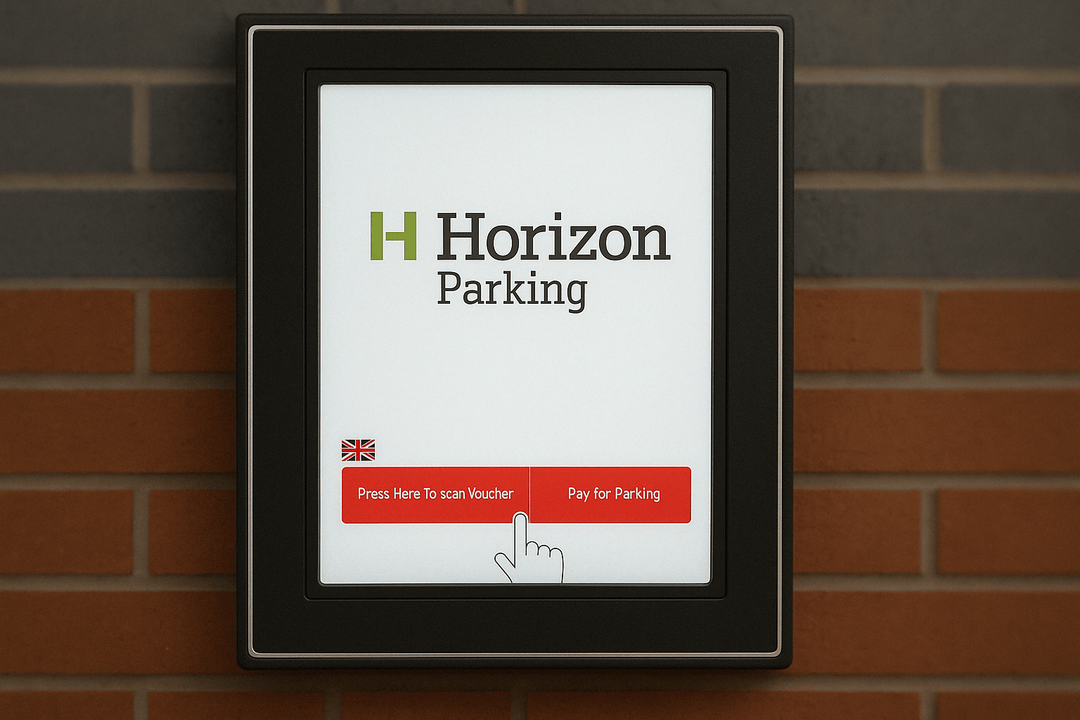
Stung by a Horizon Parking Fine? Here's How to Fight and Beat It
18 April 2025
Got a Horizon Parking fine? Learn how to fight back. Write a winning appeal letter in minutes using Resolvo. Learn pro tips to win.
Check Your Car’s Emissions in Seconds — and Understand What It Means
9 November 2025
Use Resolvo’s free emissions checker to discover your car’s CO₂ output, tax band and eligibility for clean‑air zones. No sign‑up, instant results.
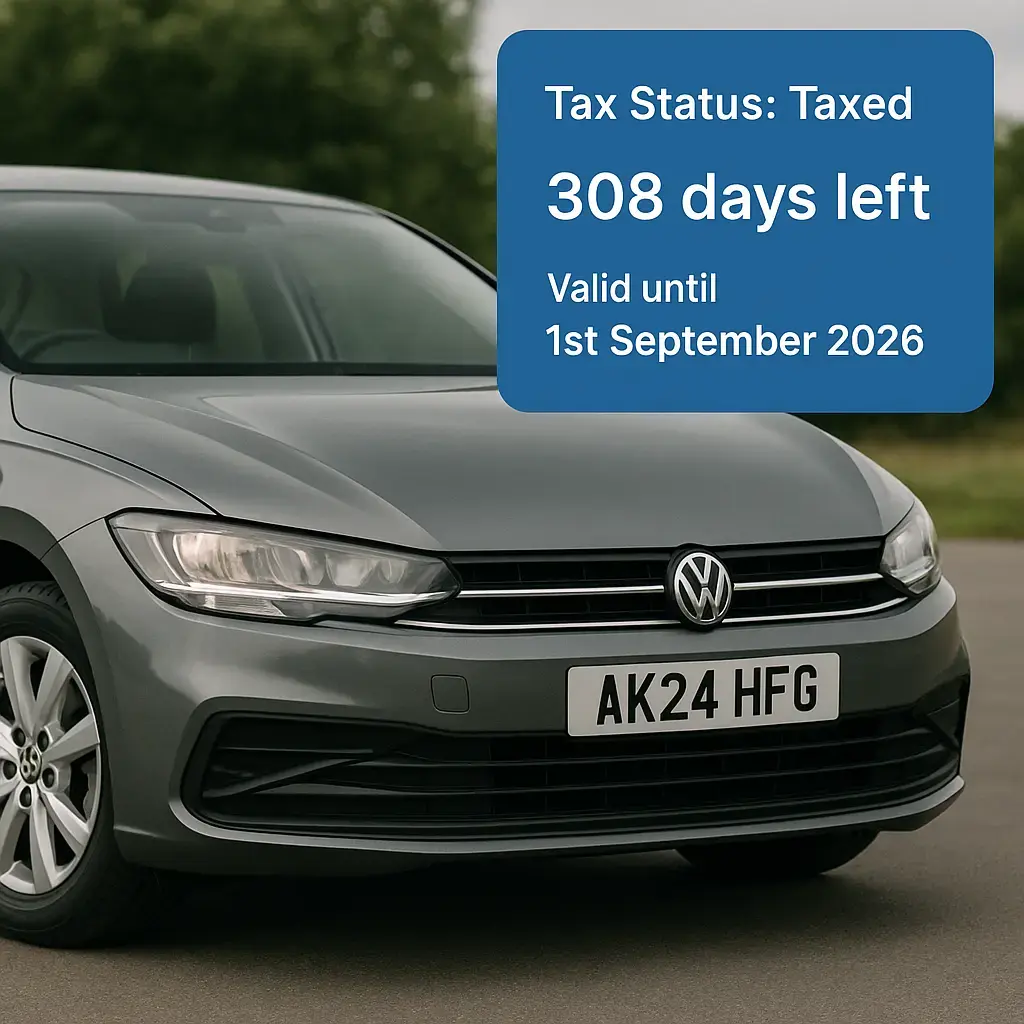
Road Tax Explained: What You Need to Know
28 October 2025
Wondering why your road tax is so high — or low? Learn how UK tax bands work, what changes in 2025, and how Resolvo helps you check your rate instantly, for free.
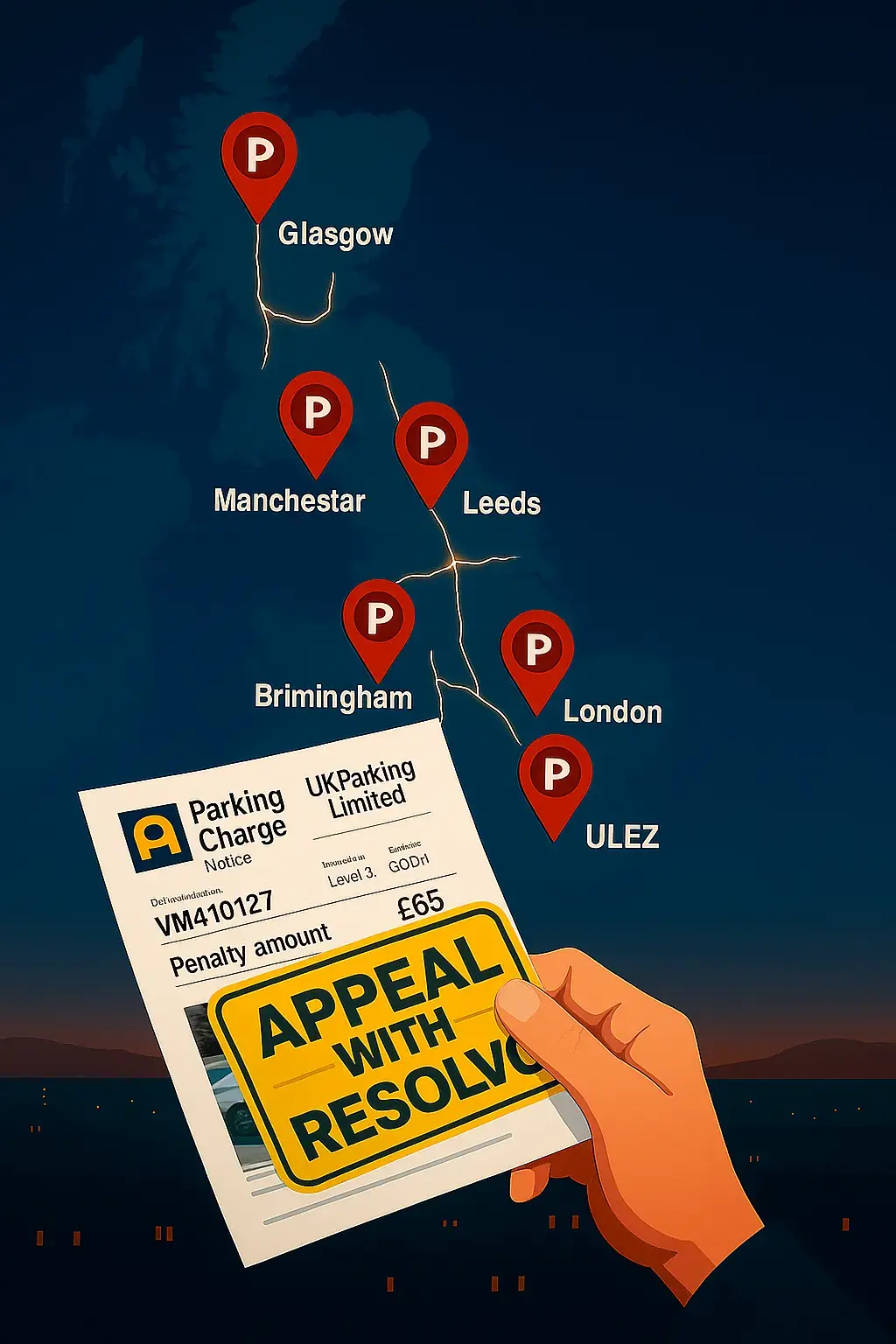
Got a Parking Fine? Upcoming Rules Could Save You
20 October 2025
Got a parking ticket? Learn about how upcoming government rules could change how fines work, what your rights are, and how Resolvo will help you fight back
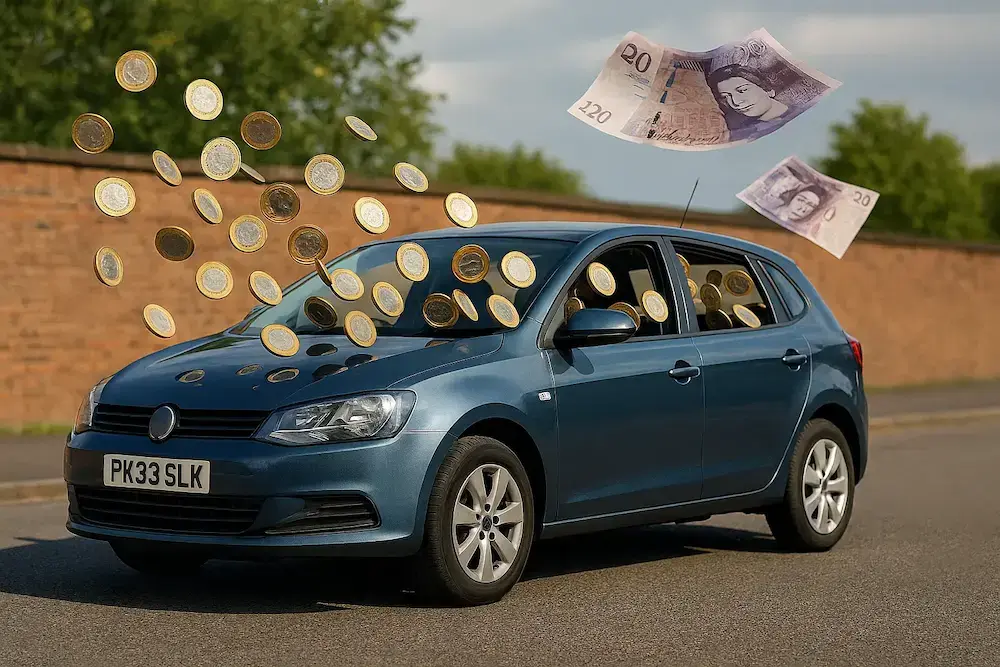
Hidden Costs of Owning a Car: What Most Drivers Don’t Expect
9 November 2025
Hidden Costs of Owning a Car: What Most Drivers Don’t Expect

The Cost of Owning a Car in 2025: What Drivers Forget
27 October 2025
Thinking of buying or budgeting for a car in 2025? Discover the true cost of car ownership — from insurance and MOTs to hidden charges and new tax rules. Get smart with Resolvo’s free car tools
